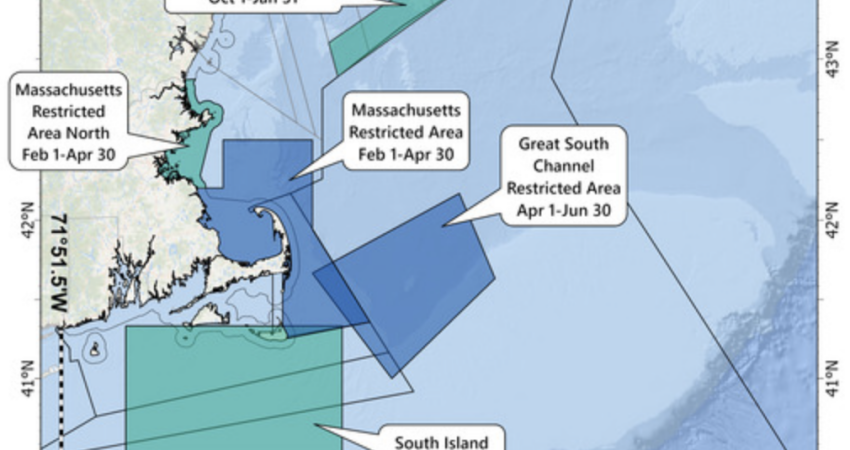A federal judge overturned restrictions on lobster and Jonah crab fishing off Massachusetts, ruling that a 2023 law limiting restrictions on fishing gear to protect whales applies to an emergency rule by the National Marine Fisheries Service.
NMFS had sought to extend 2022-23 area closures in the Massachusetts Restricted Area Wedge, making permanent late winter and spring gear restrictions when endangered North Atlantic right whales are often in the area.
The Massachusetts Lobstermen’s Association filed a challenge Feb. 9, contending that Congressional limits on new whale protection measures – led by Maine’s delegation on Capitol Hill – applied to the new Massachusetts wedge rule.
The Consolidated Appropriations Act of 2023 included a five-year mandate that NMFS’ existing Atlantic Large Whale Take Reduction Plan amendments “shall be deemed sufficient to ensure that the continued Federal and State authorizations of the American lobster and Jonah crab fisheries are in full compliance” with federal the endangered species and marine mammal laws, the MLA noted in its lawsuit.
In his March 15 ruling U.S. District Court Judge William G. Young in Massachusetts agreed.
“The Final Wedge Closure Rule is therefore void and unenforceable during that period” through Dec. 31, 2028, Young wrote in his opinion. “Final judgment is entered in favor of the Massachusetts Lobstermen’s Association.”
In a terse announcement late Friday NMFS officials said “NOAA Fisheries is reviewing the decision. The closure of the MRA Wedge is therefore no longer in effect.”
“In recent years, the Wedge Area has been an area with high right whale presence, so we ask that fishermen consider that in determining where to set and stage their gear.”
The wedge was closed by emergency rulemaking in 2022 and 2023 when federal officials said there was immediate risk to North Atlantic right whales from “mortality and serious injury caused by buoy lines in an area with a high co-occurrence of whales and buoy lines. This risk is expected to recur annually.”
In its court papers, the MLA highlighted its members’ contributions to protecting whales from entanglement danger, including area closures and gear modifications.
“Members of the MLA can also proudly claim to be the first in the nation to universally adopt use of sinking ground rope, weak line, weak inserts, and other conservation measures, including instituting mandatory use of 75 percent weak rope in all lobster and other trap fisheries, invention of their own weak insert device, known as the ‘South Shore Sleeve,”and instituting a 50 percent trap reduction in Lobster Management Area Two implemented from 2016 and 2021,” the group says.
“MLA’s leading from the front conservation and risk mitigation efforts have been successful as there is no evidence of any serious injuries or mortalities to North Atlantic right whales arising from Massachusetts-licensed lobster fishing gear in recent history, making Massachusetts waters a veritable safe haven for the North Atlantic right whale."







